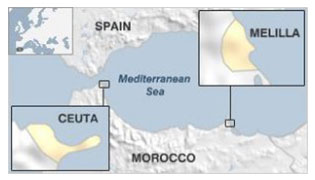Ceuta and Melilla
 The tiny Spanish enclaves of Ceuta and Melilla sit on the northern shores of Morocco's Mediterranean coast. Together they form the European Union's only land borders with Africa.
The tiny Spanish enclaves of Ceuta and Melilla sit on the northern shores of Morocco's Mediterranean coast. Together they form the European Union's only land borders with Africa.
Ceuta and its larger sister city Melilla, situated some 250 miles further south along the coast, trace their Spanish past to the 15th century.
Coveted by Morocco, they have long been a flashpoint in diplomatic relations with Spain. Madrid asserts that both territories are integral parts of Spain and have the same status as the semi-autonomous regions on its mainland.
Historically, both port cities developed as military and trade centres linking Africa to Europe. Since 1995, they have enjoyed a limited degree of self-government as Autonomous Communities.
Unemployment among the native workforce is more than 30%, among the highest rates in Spain. The cities are a magnet for thousands of traders and menial workers who cross the border from Morocco each day to earn a living.
Increasingly Ceuta and Melilla's heavily fortified borders have come under pressure from African migrants seeking a better life in Europe. Human rights groups and the European Union have raised concerns with Madrid about the deportation of illegal immigrants.
FACTS
- Ceuta and Melilla
- Spanish territories
- Population 77,000 (Ceuta), 70,000 (Melilla)
- Area (combined) 32 sq km (12 sq miles)
- Major languages Spanish, Arabic
- Major religions Christianity, Islam
- Life expectancy 75 years (men), 81 years (women)
- Currency euro
- UN, World Bank
LEADER
Head of State: King Felipe VI
Ceuta and Melilla enjoy local autonomy and have their own governments. They return deputies and senators to the Spanish parliament in Madrid. Until 1995 they were administered by provincial governments - Cadiz for Ceuta, Malaga for Melilla.
MEDIA
The national networks of Spain's public broadcaster, RadioTelevision Espanola (RTVE), are available in Ceuta and Melilla. They are served by commercial stations.
The press
- El Faro - Ceuta and Melilla
- El Pueblo de Ceuta
- Melilla Hoy
- El Telegrama - Melilla
Radio
- SER Ceuta - commercial
- COPE Ceuta - church-controlled
- Cadena Dial Melilla - commercial
TIMELINE
Some key dates in the history of Ceuta and Melilla:
5th c - Ceuta and Melilla are successively colonized by the Carthaginians, Greeks and Romans.
8th c - Ceuta is ruled by various Berber and Arab dynasties.
1415 - Portugal seizes control of Ceuta.
1497 - Spain conquers Melilla, a long history of attacks and siege by Muslim forces follows.
1556 - Melilla comes under the Spanish crown.
1580 - Ceuta comes under Spanish jurisdiction by default, after Portugal and Spain unite under one crown.
1688 - Ceuta remains under Spanish control after the union between Portugal and Spain ends.
1936 - Melilla is the first Spanish town to rise against the Popular Front Government at the start of the Spanish Civil War.
1956 - Spain retains Ceuta and Melilla after Morocco becomes independent.
1995 - Spain approves Statute of Autonomy for Ceuta and Melilla.
2002 - Moroccan and Spanish forces clash over the islet of Perejil (Parsley Island) off Ceuta.
2007 - Visit by Spain's King Juan Carlos reignites Moroccan claims of sovereignty.

